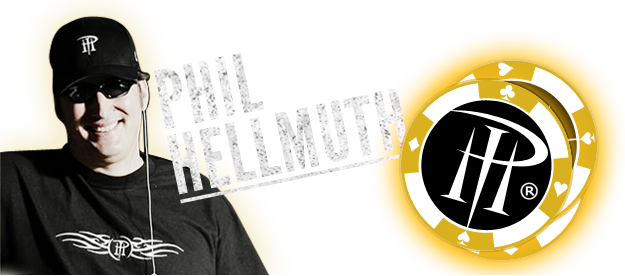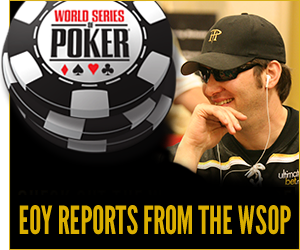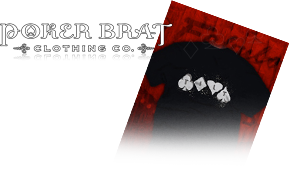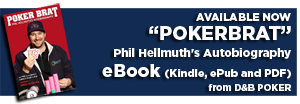-
You Bluff Me, I Bluff You
I’m playing poorly in the $5,000 buy-in short handed no-limit hold ’em event at the World Series of Poker (WSOP), and I cannot seem to climb out of this funk. I’m tired (to be expected during this 45-day-long marathon), hungry and I’ve blown off another $5,500 with 10-3 off suit on the last hand before dinner break.
I’m still fuming during dinner with a close friend and my parents. My griping goes on for more than an hour, but, when I return to the table, I’m feeling much better. I still have $16,000 in chips. And, many times in past games when I’ve felt this wiped, I still found my way to the chip lead.
After three hands, they break my table and I’m redrawn to another table. On the fifth hand at my new table, with the blinds at $400-$800 and a $75-per-man ante, I limp to first position with 9c-8h. Everyone folds except the blinds, and the flop comes down Jh-5h-4h (I need a heart to make an eight-high flush). Both blinds check, I bet out $1,200, the player in the small blind folds, and the player in the big blind calls. The turn card is the Kd, the big blind player checks, I bet out $3,000, and he folds, but not before showing the Jd! I love that I stayed so aggressive in this hand. I knew that my opponent would think that I may have a big hand, like A-K or Q-Q, because I limped into the pot in first position.
The very next hand, I’m in the big blind when Player A raises it up to $2,200 to go. Everyone else folds, and I look down at 10d-9d. Player A seems a bit weak, so I call. The flop is A-7-4, I check, Player A bets out $3,100, and I cannot escape the feeling that Player A is on a stone-cold bluff. The problem: I only have about $11,000 in chips left. Still, I study Player A for a moment more, then I take a deep breath and raise it up $3,100. If I’m wrong, I’ve just crippled myself. If I’m right, then I will have $20,000 in chips. Player A folds, and I’m feeling like a superhero. Not many people would have risked their whole tournament on a reckless bluff like that. I felt weakness, and I pounced.
During the next hand, I called a raise with 8-8 in the small blind. I assumed Player B in the big blind may be a bit reckless and, thus, may reraise it — which is exactly what happened! Player B made it $7,000 more to go. The original raiser folded, and I hesitated for a minute before I moved all-in for about $11,000 more. Player B called and showed A-K. Player B may be reckless, or he may not be reckless, but in this case he did have A-K. My eights were a 11-to-10 favorite to beat his A-K, and when the board came down 7-7-7-4-9, I collected the $43,000 pot. What a beautiful three hands. I went from about $10,000 in chips to $43,000. Everything was going according to my plans, I now felt good, had chips and was ready to ramp up my play.
From there I ran my chips up to about $160,000 before the following hand came up. Player C, sitting to my right, opened for $6,000, and I immediately made it $21,000 to go with A-A. The action moved back to Player C, and he said, “I know you’re weak.” I responded, “I have something.” I started talking to him, because 20 minutes earlier I talked when I reraised with 7-7, and I was forced to show that hand. I thought that Player C would think that I was weak — with a hand like 7-7 — if I talked along those same lines. Thus, just as I had said 20 minutes earlier I said, “I have a hand, I’ll show you if you fold.” Then he went for it, he read me as being weak! He moved all-in for more than $80,000 total with 6-6, and I insta-called. I laid out the trap — time to close it down. Fortunately my hand held up, and now I was the chip leader.
One theme common to these hands is this: I was either reading my opponents, or throwing my opponents off my scent by giving out false tells. In both cases, I control the action. When I give off false tells, that tricks my opponents into believing that I’m weak when I’m strong, or that I’m strong when I’m weak. My false tells send a signal to their brain that I have something that I do not have. We all believe our instincts, it’s only natural.
Reading an opponent well allows you to:
A) Make a well-timed bluff
B) Make a great fold
C) Play above the rim
D) All of the aboveAnswer: A
Related Posts
- Wisconsin ‘Homeboy’ Poker
- Win the War, Not All the Border Skirmishes
- Rock Stars Can Play, Baby!
- Layne Flack’s Close Call
- Blind’ed at HSP
- Gold Wins (Most Of) Record-Breaking HSP Pot
- I’m a Lucky ‘Bad Boy’
- Protect Your Pocket Eights With A Raise
- A Dirty Win to Start the New Season
- Chan Versus Phil: All-In, All Out, All Over
Recent Posts
- WSOPE 2nd place finish
- Update from this years WSOP 2019
- Happy Holidays! Updated stock at Poker Brat, new book!
- Phil Hellmuth wins historic 15th World Championship!
- Final golden ticket winner coming soon
- Poker Brat – The Phil Hellmuth Jr. Autobiography
- Phil Hellmuth’s “Pokerbrat” – Coming soon to audio book!
- Poker Night in America – Sugar House Casino
- Sugar House w Matt Glantz
- Lost and found
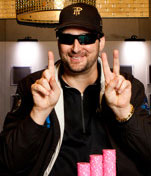
 ™
™



